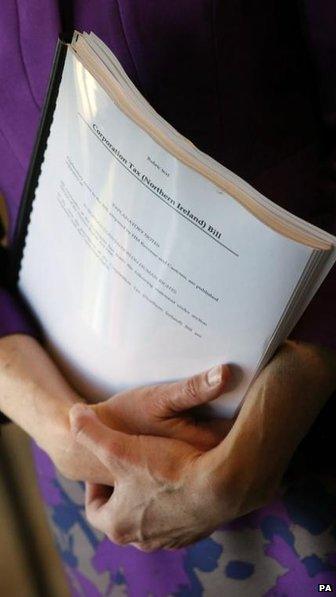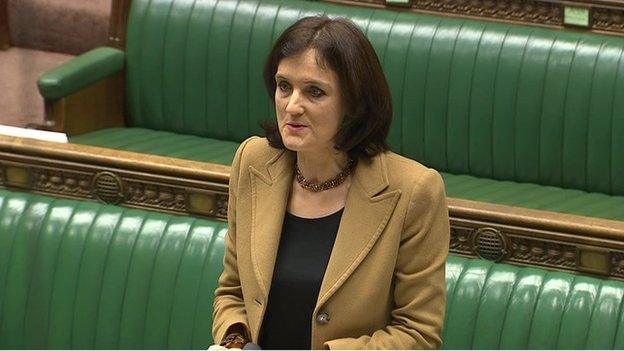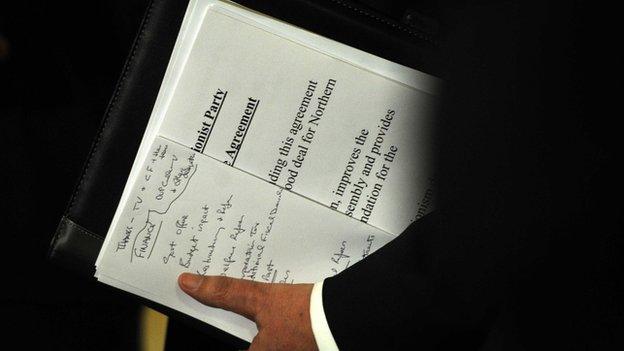Stormont corporation tax bill is published
- Published

The legislation that should allow corporation tax powers to be devolved to Stormont has been published.
The government aims to pass the law before May's general election. Labour says it will not oppose the bill.
It should allow Northern Ireland to set its own rate from April 2017.
The devolution of powers to set the corporation tax rate was a key demand of political leaders ahead of the Stormont House Agreement finalised in Belfast last month.
'Stimulate growth'
Corporation tax is a tax on the profits made by companies.
The current rate paid by businesses in Northern Ireland is 21%, compared to 12.5% in the Republic of Ireland.
The executive wants to be able to match the tax rate in the Republic of Ireland.
Theresa Villiers said the bill offered the prospect of a 'transformative change'
Northern Ireland Secretary Theresa Villiers said she was delighted at moves toward devolution of the tax.
"There is strong support for this change across all five of the parties in the Northern Ireland Executive and the business community who believe it would provide a major incentive for domestic businesses to invest further in Northern Ireland and significantly increase foreign direct investment," she said.
"Given the land border shared with a lower corporation tax jurisdiction, this measure has the potential to create thousands of new jobs and stimulate crucial growth in Northern Ireland's private sector, leading to a stronger, re-balanced economy."
She said the bill offered the prospect of a "transformative change in Northern Ireland" and was subject to the important conditions contained in the Stormont House Agreement.
'More competitive'
Chancellor George Osborne said: "This will give the Northern Ireland Executive greater power to rebalance the economy towards a stronger private sector, boosting employment and growth.

Theresa Villiers holds a bill that would devolve powers over corporation tax to the Northern Ireland Executive
"We want to work with the NI Executive to ensure that Northern Ireland will attract investment and become more competitive, boosting the entire UK economy."
Prime Minister David Cameron said: "This is a great opportunity for Northern Ireland - one that I hope its leaders will grasp with both hands."
Stormont Finance Minister Simon Hamilton of the DUP said it would "provide the executive with a powerful lever to transform the Northern Ireland economy and place it on a significantly higher growth path".
SDLP leader Alasdair McDonnell welcomed the move, but said it "must be accompanied by an appropriate fiscal package to develop local infrastructure and ensure we have the right conditions to exercise the power effectively and responsibly".
Alliance Party MP Naomi Long said it was "vital" that it was "delivered with a corresponding increased investment in skills, and responsible financial management" by the Northern Ireland Executive.
On Wednesday, Shadow Secretary of State Ivan Lewis said Labour was concerned at what he described as the government's "rush" to introduce the new legislation.
However on Thursday, he said that as Stormont would not be able to use the powers until 2017, this allowed time for all the implications to be considered.
He added that Labour would "co-operate with the government to ensure the bill can be scrutinised appropriately and dealt with speedily in this Parliament".
- Published7 January 2015

- Published23 December 2014

- Published23 December 2014

- Published3 December 2014
- Published8 January 2015
